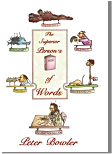

| Book of the Month | ||
 |
The Superior Person's Book of Words |  |
Publisher: David R. Godine
Author: Peter Bowler
$8.95
ISBN 978-0879235567
Do you suffer from rebarbative nescience with your vocabulary? Do you ever want to come up with a word that even your English teacher needs to have explained? If so, then Mr Peter Bowler is the person to go to. This author has made something of a career from extracting strange and unusual words from the English dictionary and explaining where and how they could be used. This is one of his earlier books, and it is exactly what it says - a list of words which can be used on any occasion when you want to appear superior through having a better vocabulary. As the author says in his introduction (which he calls a 'prolegomena' which is the same thing in more complicated language) 'words are weapons'. While bureaucracy might frustrate you, expressing that frustration in basic English will get you escorted from the building by a security guard. But call the bureaucrat a 'limacous acerebate', and there's not a lot he can do until he has found a dictionary. So if you want a vocabulary of superior pejoratives - pejoratives are negative or insulting words - then this book is useful. For the rest of us, it is enough to have fun exploring some of the more unusual bits of the English language with Peter Bowler as an entertaining and informative guide. And by the way, 'rebarbative nescience' is being annoyed and irritated by something you do not know, and a 'limaceous acerebate' is a brainless slug.
This book is a reminder that very few people know even ten percent of the words in the Complete Oxford Dictionary. Here we get 500 of some of the stranger words. These start, appropriately enough with 'Abcedarian' which means 'to arrange something in alphabetical order' and finish with the unpronounceable 'Zzxjoanw'- this last word being of use only to those who study indigenous music in New Zealand or are desperate for a really high score in Scrabble. This list of words takes up almost the entire 118 pages of the book, apart from a two-page introduction which suggests some uses for these unusual words. For example your boss might object if you come back late from your lunch break because you have been shopping. But tell him that you had an attack of oniomania (which means an irresistible urge to buy things) and you might get more sympathy. Superior words also allow one to be more honest - for example you could comment on the 'manque' qualities of a neighbour's home-made wine, being happily certain that he does not know that 'manque' means 'below an acceptable standard' or 'leaving a lot to be desired'. And of course, you can call your mother-in-law an 'objurgating ronion' to her face. If you do it with a smile, she may never discover that this is a fat, slovenly woman who complains all the time.
Who is this book for? Apart from those who like the idea of coming up with obscure insults, this book is a great gift for those people who use and work with English. Anyone with a love of English will also love words like 'defenestration' (to throw out of a window), and the author's comment that 'if the word did not exist to describe the action, the action would have to be performed to necessitate the word'. It is also of practical value to students who like to improve their vocabulary by understanding a word through studying its roots. For example we know that 'logo' is a root related to 'word' or 'argument' and 'lethe' relates to forgetfulness, so even if we have never heard of it before, we can understand that 'lethologica' means 'forgetting a word' - something most English language students do regularly.
Verdict: Not very practical, but fun
Assessment 4/10